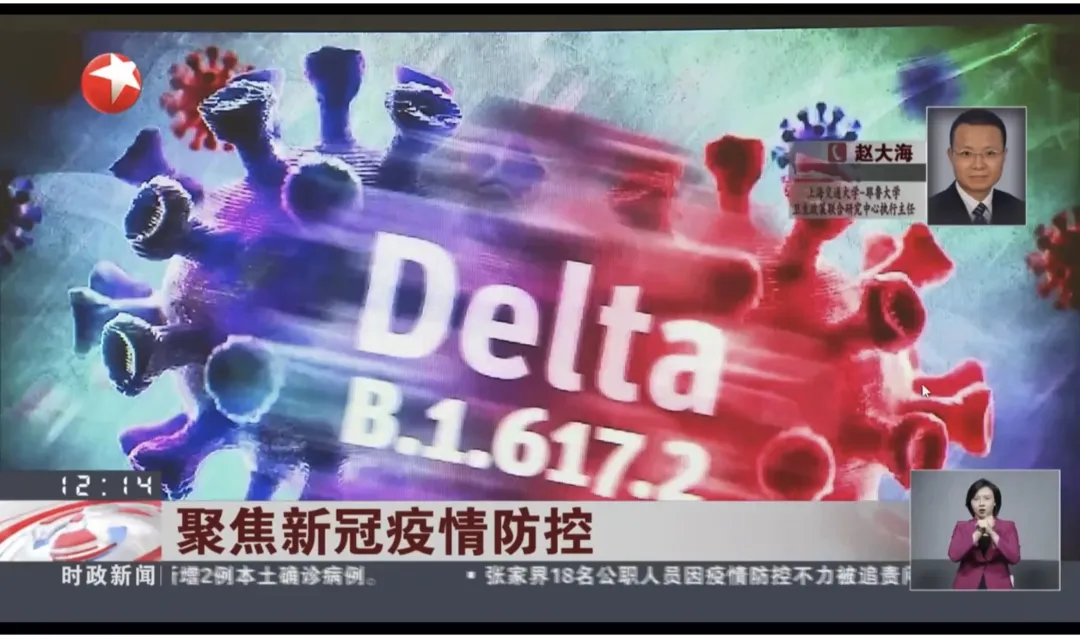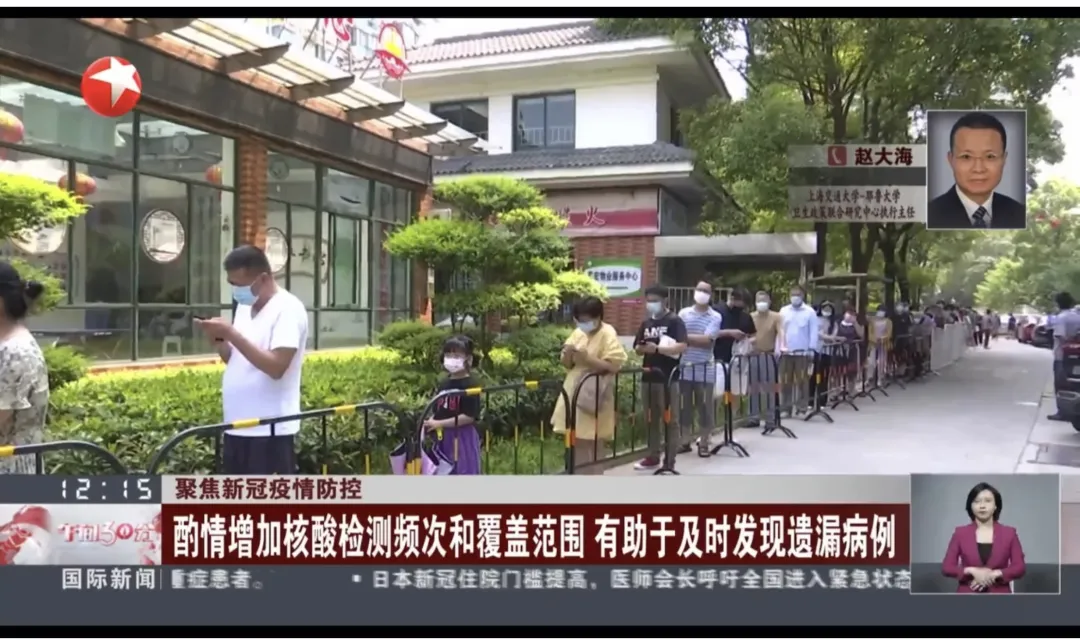上海交大赵大海教授接受东方卫视专访:德尔塔变异毒株给疫情防控带来了更大挑战

上海交通大学国际与公共事务学院教授、博士生导师,上海交通大学-耶鲁大学卫生政策联合研究中心执行主任赵大海,自新冠肺炎疫情暴发以来,对于新冠疫情暴发、防控以及卫生政策第41次接受上海电视台专访,也是第100次接受央视、上视专访。2021年8月4日,赵大海在东方卫视《午间30分》节目,就德尔塔毒株在国内多个地区散在暴发的相关话题进行了解释和评论。现将专访内容摘录如下。

主持人:根据江苏省卫健委昨天的通报,本土初代感染者的发病时间也再提前。流调显示,发病时间是7月13日,13-20日发病数有上升趋势;7月25-27日,处于高峰平台期,之后发病数波动下降,聚集性来看,江苏省内最大规模的一次聚集性涉及33人发病,传播五代,涉及9个家庭,2个棋牌室。相关信息给我们的疫情防控工作提出哪些警示?
赵大海:相比较于传统的新冠病毒以及目前所知的其他变异毒株,德尔塔变异毒株的潜伏期更短、传代间隔更短,在短短一周左右的时间内就能传播4到5代,传染力也更强。因此,德尔塔毒株对全国各地疫情防控带来了更大的挑战和压力。除此之外,现在国内较大比例的人已接种了新冠疫苗;接种新冠疫苗的人一旦感染了德尔塔病毒,比较大比例的感染者出现的症状比较轻,这样就更容易被忽视。鉴于德尔塔毒株散在暴发的特征,各地必须要升级原先针对传统新冠病毒的防控措施。随着疫情在多个地区的散在暴发,一些地区采取了全市全民核酸检测,甚至是多轮全民核酸检测的办法,目的就是确保不再有一个遗漏的感染者的前提下,再放开疫情管控的措施,逐步恢复社会经济秩序。当然,采取全市多轮全民核酸检测,是符合新冠病毒防控的科学原则的。主要原因在于再科学的一次性核酸检测,也是存在漏检这种可能性的。比如说,少部分感染者存在间隙排毒现象,而采样只是一个时间点,就有可能造成漏检。最后,希望公众都高度重视德尔塔变异毒株,做好自身疫情防控。
供稿:国务学院
日期:2021年8月4日
Dahai ZHAO’s Exclusive Interview with ShanghaiTV: Delta variant poses an even greater challenge to epidemic prevention and control
Dahai Zhao, a doctoral supervisor at the School of International and Public Affairs of Shanghai Jiao Tong University and Executive Director of Shanghai Jiao Tong University-Yale University Joint Research Center for Health Policy, has been interviewed by ShanghaiTV for the 41st time (the 100st time by CGTN / ShanghaiTV) since the COVID-19 pandemic. On 4 August, 2021, Zhao commented on scattered outbreaks of the Delta strain in several parts of the country on “Noon News” of Shanghai TV.
Anchor: According to the Jiangsu Provincial Health Commission yesterday, the onset of the first generation of indigenous infected people earlier. The time of onset of this round of cases was July 13, according to the survey. The number of cases increased from July 13 to 20, peaked from July 25 to 27, and then fluctuated and decreased. In terms of clustering, the largest cluster in Jiangsu province involved 33 cases. The transmission involved five generations, nine families, including two chess and card rooms. What warnings does this information give us for epidemic prevention and control?
ZHAO: Compared with the traditional novel coronavirus and other known strains, the Delta strain has a shorter incubation period and a shorter passage interval. It can spread for 4 to 5 generations in just a week or so, and is more contagious. As a result, the Delta strain has brought greater challenges and pressure to epidemic prevention and control across the country. In addition, a large proportion of the country's population has now been vaccinated. Once infected with Delta virus, people who get the coronavirus vaccine will experience milder symptoms, making them more likely to be ignored. Given the scattered nature of the outbreak of the Delta strain, it is imperative to upgrade prevention and control measures against the traditional novel coronavirus. With the spread of the epidemic in several regions, some regions have adopted nucleic acid testing for the whole population, or even multiple rounds of nucleic acid testing for the whole population. The aim is to ensure the gradual restoration of social and economic order on the premise that there is no longer a single missing infected person. Of course, the adoption of multiple rounds of nucleic acid testing in the city is in line with the scientific principles of novel coronavirus prevention and control. The main reason is that one-off nucleic acid testing has the possibility of missing detection. For example, a small number of infected people have the phenomenon of interstitial detoxification, and when the sampling is only a point in time, there may be missed detection. Finally, we hope that people pay close attention to the delta mutant strain and do their own prevention and control.
Contributor: SIPA, SJTU
Date: August 4, 2021

